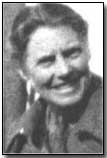Feature Articles - The Life of Evelina Haverfield - Dobrudja - and a Russian Decoration
 The S.W.H. units arrived in the Dobrudja in late September, just after
the Serbs had suffered their military disaster.
The S.W.H. units arrived in the Dobrudja in late September, just after
the Serbs had suffered their military disaster.
Dr. Inglis established a hospital in the southern Dobrudja near the scene of the fighting, and proceeded to care for Russian and Romanian casualties. The ambulances travelled from the base hospital to field stations nearer to the fighting and transported the wounded soldiers, two to a car, back to the base hospital.
But soon the invaders were driving the defenders steadily north, and the S.W.H. personnel once again found themselves involved in a massive military retreat. Dr. Inglis had to move her valuable operating equipment and medical team, to a town on the Danube far north of the fighting.
There, she and her team worked with the Romanian medical organizations in meeting the needs of thousands of wounded soldiers. Because of the ever-changing situation created by the enemy invasion, the Scottish Women became separated and tended to help the Allied forces in any way they could, wherever they found themselves.
Evelina, in a report, described the scene, one day, during the retreat:
"We could not start the Seldon lorry so with much difficulty I got eight oxen to pull her, but the guns got nearer and my second in command got in a stew, and I was forced to abandon her with her load of Ford tyres; and alas, no means of replacing them. Streams of troops, refugees, wagons, guns and animals of all sorts were trailing along all day, and as darkness fell all converged on the town. The streets, or rather muddy lanes between the houses soon became one mass of terrified humanity, screaming, crying and cursing. Cars and scared animals added to the noise; scenes of terror and despair never to be forgotten. We remained in our cars in the mud until 2 a.m. when we made a start."
During October and November, the invaders drove the Romanian and Russian defenders steadily north in the Dobrudja. By the end of November, the Russian-Romanian resistance collapsed, and the situation turned into a rout. The Allied soldiers tried to escape beyond the delta of the Danube River to safety on Russian soil.
During the last three weeks of this disastrous campaign, Evelina and the transport drivers continuously drove south as far as they could go into the fighting area, and loaded their ambulances and touring cars with wounded and exhausted soldiers, and drove them north out of range of the enemy fire. This daring rescue operation won Evelina a Russian military medal for bravery under fire.
When the Central Powers had driven the Allied forces into the mountains of northern Romania, and Russian territory beyond the Danube delta, they halted their attack. They now occupied and controlled all of southern Romania which contained the capital city, Bucharest, and most of the industries and the rich agricultural lands. They could contain the enemy against further attack without the cost of invading and holding more territory.
With the fighting over by Christmas there was little for the transport section to do. Evelina sent most of the vehicles to Odessa for mechanical maintenance. The medical personnel were all involved for many months into the future, with caring for thousands of wounded.
With the political situation in Russia worsening in the months leading up to the Revolution, the British Government limited the number of women going out to units there, and favoured bringing home all who were not currently required.
Because Dr. Inglis wanted Evelina to return to England and report to the S.W.H. London Committee, she left Romania in March 1917, travelled through Russia just as the Revolution was erupting, and arrived back in London a month later.
Next - Supporting Serbs from London - and Women's Suffrage
'Strafing' is attacking ground troops by machine guns fired from low-flying aircraft.
- Did you know?
